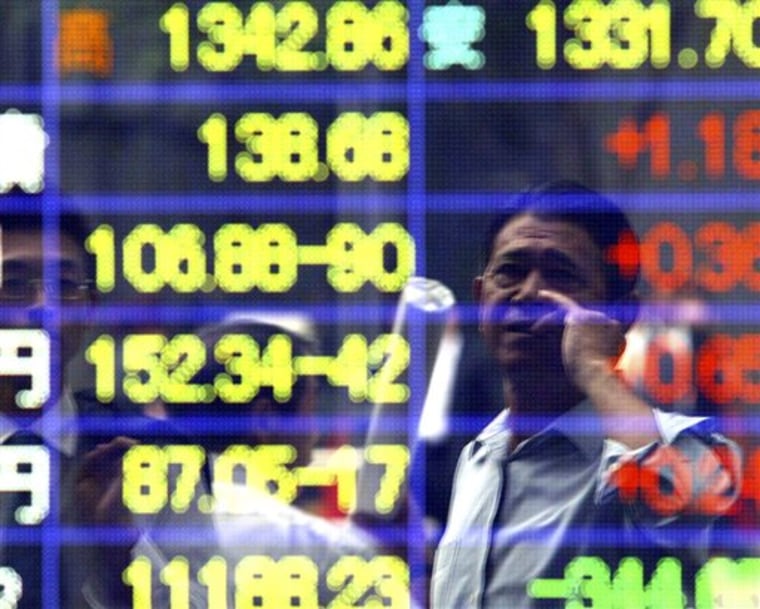World stock markets fell sharply Friday in the wake of a sell-off on Wall Street amid mounting concerns about a slumping U.S. economy and its impact on global growth.
Disappointing reports on U.S. retail sales and jobless claims overnight undercut hopes for a late-year recovery in the world’s biggest economy, a critical export market.
Before the U.S. stock market opened Friday, the U.S. government disappointed investors with news that the economy shed jobs for the eighth straight month in August and at a faster-than-expected pace. Dow Jones industrial average futures fell 94, or 0.84 percent, to 11,106.
By afternoon in Europe, Britain’s FTSE-100 was down 0.87 percent to 5,315.50, Germany’s DAX lost 1.41 percent to 6,191.16, and France’s CAC 40 fell 0.95 percent to 4,262.99.
That reflected some recovery from morning trading, when the FTSE-100 had been down 1.73 percent, the DAX 1.72 percent and the CAC 40 1.62 percent.
In Moscow, the ruble-denominated RTS benchmark was down 6.51 percent in late afternoon trading, sinking to the 1,400-point level which has not been seen since June 2006. Moscow-based analysts say they see the market going further down to 1,300 points this year.
Russia’s U.S. dollar-denominated MICEX was down 5.54 percent.
Across in Asia, stock markets lost ground. In Japan, the benchmark Nikkei 225 index sank 2.75 percent to 12,212.23. Hong Kong’s Hang Seng index tumbled 2.24 percent to 19,933.28, dropping below 20,000 for the first time in more than a year.
Markets in India, Australia and Singapore also were down sharply. China’s Shanghai index slid 3.3 percent to its lowest close in 21 months.
European markets, adjusting to the falls in Asia and the 3 percent declines seen in the U.S. markets overnight, also made a poor start in Friday trading.
“The financials are once again under pressure following comments from Bill Gross at PIMCO — the world’s largest bond fund — that implied the market was set to experience a “financial tsunami,” said Stephen Pope, chief global markets strategist for Cantor Fitzgerald.
“All banks are weaker, although with gloomy euro-zone economic news in the system, and a hawkish policy still persisting from the ECB, Irish and Spanish names are especially hard pressed,” he added.
Mark Matthews, chief Asia strategist at Merrill Lynch, said emerging markets in Asia and other regions have been hit hard lately as investors withdrew funds and faith in the global economy withered.
“People want to be confidant that the economy of the world can get better, and right now they don’t have that confidence,” Matthews said. “They think the global economy is still going to get worse.”
Pessimism permeated markets as they nervously awaited the August U.S. employment report later Friday.
“This is generally expected to be showing a further 75,000 jobs were lost in August, although following bad data yesterday there is a fear that the number could be nearer 100,000 and that might just tip the U.S. unemployment rate above 5.7 percent,” said Pope.
News Thursday from major U.S. retailers that shoppers curtailed their spending last month helped send the Dow Jones industrial average down 344.65 points, or 2.99 percent, to 11,188.23. The Nasdaq composite index declined 3.2 percent, or 74.69 points, to 2,259.04.
“It was ugly in the States; many are still taking their leads from the U.S.,” said Lorraine Tan, director at Standard & Poor’s equity research in Singapore. “And there’s just an overall concern with global growth.”
Investors bracing for weak U.S. jobs figures fueled selling in Japan, said Masaru Ohnishi, equity strategist at JP Morgan Securities in Tokyo.
But because markets have already fallen so sharply, they are “likely to rebound if results are good,” he said.
Toyota Motor Corp. retreated 2.5 percent to 4,750 yen, Nissan Motor Co. tumbled 3.6 percent to 800 yen, and Mazda Motor lost 6.9 percent to 527 yen.
Sony Corp. dived 4.2 percent to 3,880 yen after the consumer electronics maker announced Thursday a worldwide recall of 440,000 Vaio laptop computers due to a wiring flaw that could cause overheating.
In Hong Kong, investors sent Chinese commodity producers spiraling, with Angang Steel losing 7.5 percent to HK$8.56 and Aluminum Corp. of China, or Chalco, down 3.2 percent to HK$6.19.
Property stocks fell sharply after Goldman Sachs issued a pessimistic outlook for the sector. Hong Kong’s leading property firm Sun Hung Kai tanked more than 6 percent, while Cheung Kong plunged 5.7 percent.
In Shanghai, selling was heavy across the board, with the key index falling 3.3 percent to 2,202.45. PetroChina, the Shanghai index’s biggest traded share, sank 4.2 percent.
In India, the Sensex fell 2.8 percent to 14,483.83.
